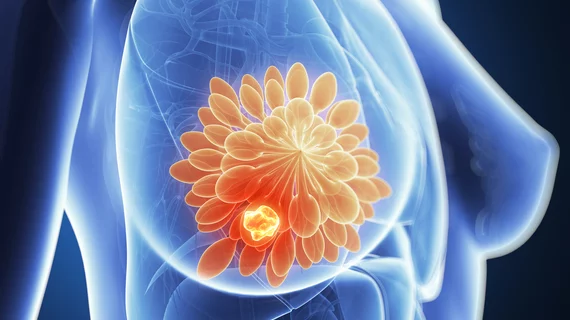Offering same-day cancer risk assessments, genetic testing to boost a breast imaging practice’s value
Breast imaging centers can also offer same-day risk assessments and genetic testing programs to add value beyond traditional radiology services.
That’s according to a new study out of Banner MD Anderson Cancer Center, published Wednesday in Academic Radiology. Women are often under screened for these pathogenic mutations, and seldom receive the genetic counseling that follows.
Wanting to address this challenge, MD Anderson piloted radiology-operated, proactive, same-day risk assessments and genetic testing to help diagnose high-risk women also undergoing imaging. Bottom line: The add-on proved feasible, increasing value for patients through better clinical outcomes and lower costs.
“These proactive programs persuade higher proportions of women to pursue cancer risk management compared to passive programs that place the onus of specialist consultation and genetic testing on the patient and PCP,” Vilert Loving MD, with the Division of Diagnostic Imaging at the Gilbert, Arizona-based institution, and colleagues wrote Dec. 16. “Radiology departments should consider implementing these programs, as they add value to cancer care beyond traditional imaging services.”
Loving et al. launched their Comprehensive Assessment, Risk & Education Program back in June 2019, tracking data for more than a year. Women undergoing breast imaging also completed questionnaires to help determine their risks, along with gauging genetic testing eligibility using National Comprehensive Cancer Network criteria. Pretest counseling and saliva sample collection all occurred on the same day.
All told, 3,345 women filled out the form; 1,080 (32.3%) met genetic testing criteria; 468 of that population (43.3%) submitted genetic samples; and 416 (38.5%) completed testing. Of the latter, 269 (64.7%) tested negative, while 109 (26.2%) showed variants of uncertain significance and 38 (9.1%) were diagnosed with pathogenic mutations. Of that final group, 13 (34.2%) implemented cancer risk-reduction strategies at the imaging center.
“Our experience demonstrates that breast imaging centers can feasibly operate comprehensive, same-day risk assessment and genetic testing programs,” the authors advised.
Read more about their efforts in Academic Radiology here.

